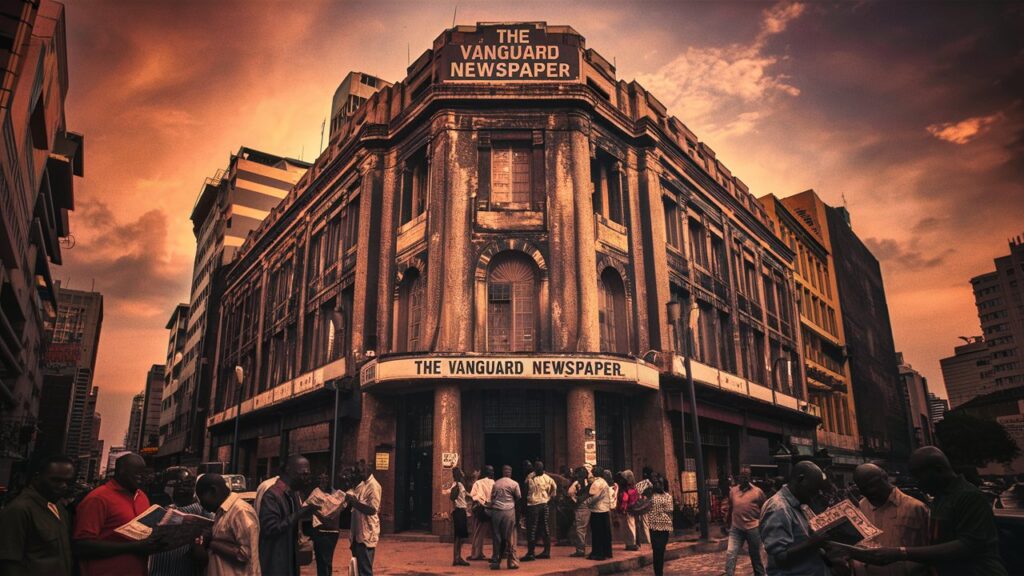Introduction
For over four decades, The Vanguard Newspaper has stood as a pillar of credible journalism in Nigeria, shaping public discourse and holding power to account. Founded in 1983 by veteran journalist Sam Amuka-Pemu, the publication has evolved from a regional tabloid to a national daily, renowned for its incisive reporting, editorial independence, and commitment to democratic ideals. In an era where misinformation and sensationalism threaten media integrity, Vanguard remains a trusted source of news, blending tradition with innovation. This article explores the newspaper’s journey, its transformative impact on Nigerian media, and its strategies for navigating the challenges of the digital age.
1. The Rise of Vanguard Newspaper: Pioneering Independent Journalism
Keywords: Founding, Editorial Independence, National Influence
The inception of Vanguard Newspaper in 1983 marked a turning point in Nigeria’s media landscape. At a time when military regimes stifled free speech, founder Sam Amuka-Pemu envisioned a platform that prioritized truth over propaganda. With its headquarters in Lagos, the paper quickly distinguished itself through bold investigative reporting and a refusal to align with political agendas. Its early coverage of corruption scandals and human rights abuses earned it both acclaim and persecution, including temporary bans by authoritarian governments.
By the 1990s, Vanguard expanded its reach beyond Lagos, establishing bureaus in Abuja, Port Harcourt, and Kano. This national presence allowed it to amplify underrepresented voices, particularly in regions affected by ethnic tensions and economic inequality. The paper’s editorial philosophy—rooted in fairness, accuracy, and public service—cemented its reputation as a defender of democracy during Nigeria’s tumultuous transition to civilian rule in 1999.
2. Key Sections and Their Impact: Politics, Business, and Beyond
Keywords: Investigative Reporting, Business Analysis, Cultural Coverage
Vanguard’s content strategy revolves around its core sections, each addressing critical facets of Nigerian society. The Politics Desk remains its crown jewel, offering in-depth analyses of electoral processes, governance, and policy debates. Investigative pieces, such as exposés on embezzlement within state governments, have spurred legislative reforms and public protests.
The Business and Economy section provides insights into Nigeria’s volatile markets, oil industry trends, and entrepreneurship. During the 2016 recession, Vanguard’s coverage of Central Bank policies and SME survival strategies became essential reading for policymakers and investors. Equally impactful is the Metro section, which highlights grassroots issues—from urban infrastructure failures to community-led initiatives.
Cultural preservation is another priority. The Arts and Lifestyle division celebrates Nigeria’s rich heritage through profiles of emerging artists, critiques of Nollywood films, and features on traditional festivals. By balancing hard news with cultural storytelling, Vanguard fosters a nuanced understanding of national identity.
3. Digital Transformation: Embracing the Online Revolution
Keywords: Online Presence, Multimedia Storytelling, Social Media Engagement
Recognizing the global shift toward digital consumption, Vanguard launched its online platform in the early 2000s. Today, Vanguardngr.com attracts millions of monthly visitors, offering real-time updates, opinion columns, and multimedia content. The platform’s interactive features—such as live blogs during elections and podcasts on economic trends—cater to younger, tech-savvy audiences.
Social media has further amplified its reach. With over 2 million followers across Facebook, Twitter, and Instagram, Vanguard leverages these platforms to crowdsource stories, engage readers in polls, and debunk viral misinformation. Its YouTube channel, featuring documentaries and interviews, underscores a commitment to multimedia storytelling. However, this digital pivot hasn’t been without challenges, including revenue diversification and competition from clickbait-driven outlets.

4. Challenges in a Changing Media Landscape
Keywords: Financial Sustainability, Fake News, Press Freedom
Despite its successes, Vanguard faces existential threats. Print circulation has declined sharply, forcing reliance on digital ad revenue, which remains insufficient. The rise of “fake news” blogs undermines public trust in established brands, while government surveillance and harassment of journalists persist. In 2021, Vanguard reporters covering police brutality during the #EndSARS protests faced intimidation, highlighting ongoing risks to press freedom.
To adapt, the newspaper has experimented with subscription models and partnerships with international media watchdogs. Training programs on digital verification and cybersecurity aim to fortify its newsroom against disinformation campaigns.
5. The Future of Vanguard: Innovation and Legacy
Keywords: Youth Engagement, Technological Integration, Global Partnerships
Looking ahead, Vanguard seeks to balance innovation with its founding principles. Plans to launch a mobile app with personalized news feeds and AI-driven analytics reflect its tech ambitions. Collaborations with platforms like Google News Initiative aim to enhance data journalism capabilities.
Equally critical is nurturing the next generation of journalists. The Vanguard Journalism Fellowship, launched in 2022, mentors young reporters in investigative techniques and ethical reporting. By investing in youth and technology, the paper aims to sustain its legacy while redefining Nigerian media for the 21st century.
Conclusion
The Vanguard Newspaper has not only chronicled Nigeria’s history but actively shaped it. From its defiant stance against dictatorship to its embrace of digital innovation, the publication exemplifies resilience and adaptability. As it navigates financial pressures and evolving reader habits, its core mission—to inform, educate, and advocate—remains unchanged. In a world hungry for truth, Vanguard’s story is a testament to journalism’s enduring power.
Frequently Asked Questions (FAQs)
Q1: When was Vanguard Newspaper founded, and by whom?
A: Vanguard was established in 1983 by Sam Amuka-Pemu, a veteran journalist and advocate for press freedom.
Q2: How has Vanguard adapted to the digital age?
A: The paper launched Vanguardngr.com, expanded into social media, and produces podcasts, videos, and interactive content to engage online audiences.
Q3: What challenges does Vanguard face today?
A: Key issues include declining print revenue, competition from misinformation outlets, and threats to journalists’ safety.
Q4: What makes Vanguard’s political coverage unique?
A: Its investigative rigor, impartial analysis, and willingness to critique both government and opposition parties set it apart.
Q5: How does Vanguard plan to stay relevant in the future?
A: Through tech integration (e.g., AI and mobile apps), youth-focused initiatives, and global partnerships to enhance storytelling and sustainability.
